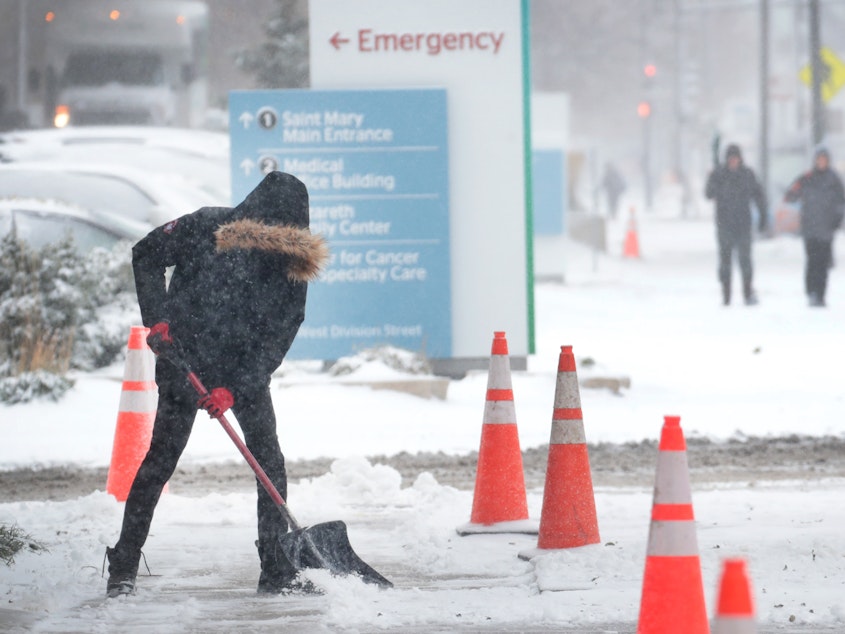Arctic Blast Grips Parts Of the U.S., With Snow And Record-Breaking Cold

Record-breaking cold and snowfall is numbing many parts of the U.S. from the Great Plains to the East Coast and north through New England. By Wednesday the cold snap is expected to spread farther south to the upper Texas coast in what is being described as an "arctic outbreak" by the National Weather Service.
The dead-of-winter temperatures come with roughly five weeks of fall remaining on the calendar.
"The arctic airmass that has settled into the Plains will continue to spread record cold temperatures south and eastward into the Ohio Valley and down into the southern Plains," according to the National Weather Service.
It adds: "Low temperatures in the teens and 20s will be common along much of the East Coast, the Ohio Valley, and down as far south as the upper Texas coast, making it feel like the middle of winter for these areas."
An estimated 300 cold-weather records are expected to be tied or broken by Wednesday. The National Oceanic and Atmospheric Administration estimates 30% of the continental U.S. is covered by snow.
Even Texas, where weather is typically mild this time of year, saw temperatures drop nearly 40% in a 24-hour period between Monday morning and Tuesday morning.
According to a NWS tweet, temperatures in Texas cities Galveston, Sugar Land and College Station dropped by 31%, 33% and 37% respectively.
Forecasters say a "freeze and hard freeze warnings" are in effect from the Texas coast to coastal South Carolina, with temperatures beginning to gradually rise by Thursday.
A massive storm dumped nearly a foot of snow at the Buffalo, N.Y., airport, according to NWS, as of Tuesday afternoon.
The Buffalo News called the storm "record-shattering," saying it broke a Nov. 11 snowfall total that had stood for the city for 77 years. The paper writes: "Monday's snow totaled 8.7 inches, well above the old record of 5.3 set on Nov. 11, 1942. The record was actually surpassed before 9 p.m., when the snowfall hit 5.9 inches, but it kept coming down overnight."
The Buffalo News notes the city of Rochester, N.Y., about 75 minutes east of the city, "also smashed its record Monday as its 8.2 inches of snow broke the mark of 5.2 set on Nov. 11, 1991."
In the Chicago area, a storm being dubbed "snowvembruary" set single-day snowfall records for Nov. 11 at Chicago's O'Hare airport (3.4 inches) and in Rockford, Ill., (3.2 inches).
A day after an American Eagle flight slid off the runway at O'Hare Airport during a storm, the Chicago Tribune reports conditions at both O'Hare and Midway international airports "improved slightly" after thousands of flights were delayed or canceled because of the weather.
None of the crew members or passengers on the flight were injured.
"One hundred flights had been canceled at O'Hare and another 729 were delayed. At Midway, five flights were canceled and 89 were delayed," the Tribune reports.
The weather is also being blamed for deaths.
Icy conditions in Kansas were said to have caused the death of an 8-year-old girl in a three-vehicle crash in Osage County, southwest of Kansas City on Monday, according to the Kansas Highway Patrol.
In the Lansing, Mich., area, the Eaton County Sheriff's Office posted on Facebook on Monday that deputies responded to a two-vehicle crash.
"Upon arrival, deputies discovered that all three occupants in one vehicle were deceased. There was one male, age 57, and two females, ages 64 and 81 in this vehicle that died in the crash," the sheriff's office reported.
Meanwhile for the West, NWS predicts "persistent warm and dry weather" which it says elevate concerns for fire weather, particularly in Southern California. [Copyright 2019 NPR]

